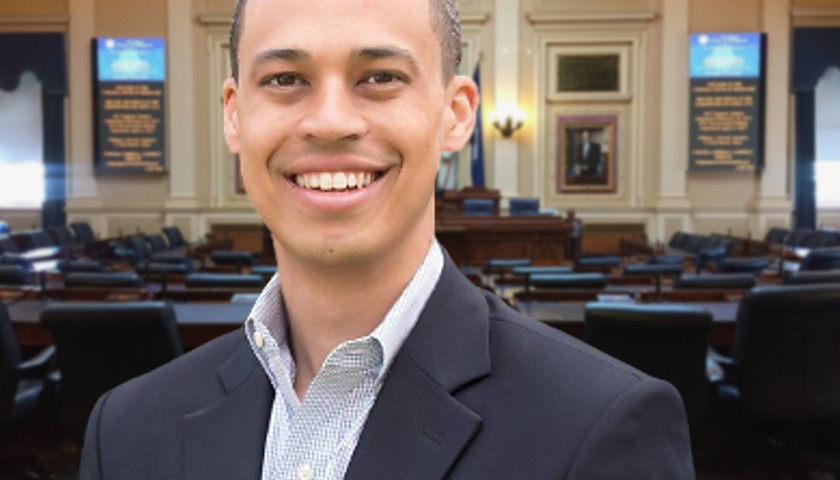Attorney General candidate Delegate Jay Jones (D-Norfolk) has pre-filed a bill that would automatically reinstate felon voting rights after completion of their sentence. Governor Ralph Northam is also pushing for passage of the bill, HJ546.
“If you break the law in Virginia, you’ll be punished. But right now, part of the punishment follows you for the rest of your life – even after you’ve paid your debt to society. ” Northam said in his State of the Commonwealth address. “You lose your civil rights – like the right to vote – and you don’t get them back unless the governor acts to give them back.”
Northam said, “That shouldn’t be up to one person, and you shouldn’t have to ask for your basic civil rights to be restored.”
“For far too long we’ve hidden behind these provisions to deny people the right to vote,” Jones told The Virginia Mercury. “We need to move into the 21st century on a whole host of things.
Changing the law actually requires a constitutional amendment, a process that requires two General Assemblies to pass the bill, with a House election held between the two sessions, according to the Virginia Constitution. Then, the amendment goes to the public for a vote.
In Virginia, felons must apply to have their voting rights restored after completing their sentences, and after vetting by state departments, the governor must individually sign off on the restoration, according to a Secretary of the Commonwealth information page. Virginia is one of only 11 states where felon voting rights are not automatically restored, according to the National Conference of State Legislatures.
Felons also lose other civil rights, including the right to own a gun, and have to follow a more difficult process to have that right restored.
Northam is just the latest in a string of Virginia governors to push for automatic restoration of felon voting rights. Northam, former Governor Terry McAuliffe (D), and former Governor Bob McDonnell (R) all signed off on restoring voting rights to large numbers of felons.
McAuliffe’s restoration voting rights to over 200,000 felons by executive order attracted criticism from Republicans, who said the Governor was trying to boost then-presidential candidate Hillary Clinton’s voter base, according to Fox News. The Supreme Court of Virginia eventually ruled that the action was unconstitutional, since the felons were not considered on an individual basis, according to Harvard Law Review. McAuliffe responded by announcing that he would individually approve the cases. He eventually approved voting rights for over 170,000 people, according to a Northam press release.
McDonnell eliminated a waiting period for non-violent felon voting restoration rights during his administration, according to MSNBC.
“Once individuals have served their time, and paid their fines, restitution and other costs, they should have the opportunity to rejoin society as fully contributing members,” McDonnell said in 2013, according to NBC4. “As a nation that embraces second chances and believes in redemption, we want more productive citizens and fewer people returning to prison.”
Conservative vote advocate J. Christian Adams criticized McDonnell for the effort, arguing in a Washington Times op-ed, “Those who have shown contempt for criminal laws should have no voice in the process of writing them.”
NBC4 reported that Republicans, who controlled the General Assembly, blocked McDonnell’s efforts to pass automatic restoration of voting rights of nonviolent felons. Adams suggested that Democrats would gain more votes from ex-felons than Republicans.
“Republican elected officials must realize that when it comes to election process issues such as felon voting and voter photo identification laws, they are regularly outsmarted by the organized left,” Adams wrote in the 2013 op-ed. “Republicans who support their opponents’ election law agenda will gain no friends, at least not friends they should want.”
In 2015, Senator Rand Paul (R-Kentucky) introduced a bill in the U.S. Senate that would restore non-violent felons’ voting rights after their sentence was served. The bill died in committee. At the time, Paul estimated that only 30 percent of Senate Republicans would support his bill, according to Politico.
“A criminal record is currently one of the biggest impediments to voting in federal elections. The Civil Rights Voting Restoration Act will reform existing federal law and give low-level ex-offenders another opportunity to vote,” Paul said in a press release. “This is an issue that I feel strongly about, and I will continue to fight for the restoration of voting rights in the hopes of giving non-violent ex-offenders a second chance.”
– – –
Eric Burk is a reporter at The Virginia Star and the Star News Digital Network. Email tips to [email protected].
Photos “Del. Jay Jones” by Del. Jay Jones and “Virginia House of Delegates” by Antony-22 CC4.0.




